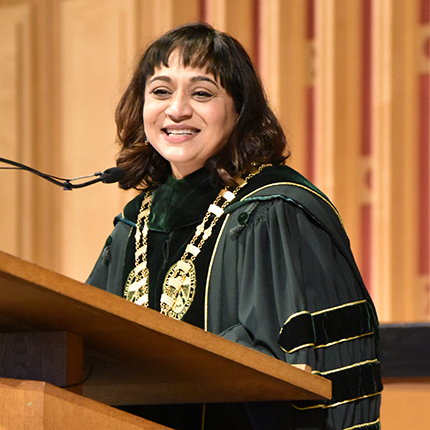 Pareena Lawrence, the 2018 recipient of the Krannert School’s John S. Day Distinguished Alumni Academic Service Award, always knew she wanted to change the world. As her career path began taking shape, however, she never saw herself becoming a university president.
Pareena Lawrence, the 2018 recipient of the Krannert School’s John S. Day Distinguished Alumni Academic Service Award, always knew she wanted to change the world. As her career path began taking shape, however, she never saw herself becoming a university president.
But she’s done that and made history in the process.
Lawrence, who earned a master’s degree in management and a PhD in economics from the Krannert School, was inaugurated in February 2018 as the 12th president of Hollins University, a private university in Roanoke, Virginia.
Growing up with limited economic means in northern India, where gender roles were clearly defined, it was important to Lawrence to make the world better.
She graduated from the University of Delhi at age 21, and because of the indefinite timeline on doctoral degrees in India, she made the decision to leave her friends and family to continue her education at Krannert. It was the combination of Purdue’s worldwide reputation and small-town feel that made the sale.
“What I really wanted to do was go change the world. It seemed to me, as I was doing my dissertation, that the best way to change the world would have been to get a job with USAID or the World Bank,” Lawrence says.
But that’s not where she found her calling. A hiring freeze during her graduation year rerouted her to academia.
“I thought it was going to be a short tenure,” she says. “But within three months, I knew that this was my calling — preparing the next generation to go change the world.”
She found that rather than going out into the world as a single economist, she could make an exponentially larger difference in the world by sending out hundreds — an act she calls “the multiplier effect.”
After a distinguished career as a professor at the University of Minnesota Morris, Lawrence started breaking down barriers for underrepresented groups. She became the first female provost at Augustana University in Illinois, and ultimately, the first woman of color to reach the presidency at Hollins University — an institution built in significant part by the enslaved 176 years ago.
Her achievement, she says, is both a needed change in higher education and a challenge.
“People have different expectations for you when you are a person of color," Lawrence says. "Many of my students of color, for example, think I can do magic, can change the world for the better because I was the provost and now the president. I often sit and talk to them, and I tell them this is a struggle for all of us. Just because you have a woman of color in leadership, things are not going to change overnight. We will still have to struggle to bring about change. We still need everybody to be part of making this place — or any place we’re at — more inclusive.”
And inclusivity is central to her philosophy — one that took shape at Purdue, and one she’s determined to multiply.
“Purdue opened doors for me and provided me with incredible opportunities,” Lawrence says. “It provided access for me, and that’s something I’ve continued on — making sure our institutions provide access.”

